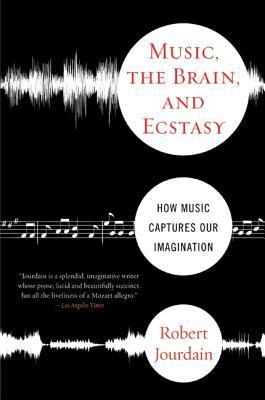What do you think?
Rate this book


What makes a distant oboe's wail beautiful? Why do some kinds of music lift us to ecstasy, but not others? How can music make sense to an ear and brain evolved for detecting the approaching lion or tracking the unsuspecting gazelle? Lyrically interweaving discoveries from science, psychology, music theory, paleontology, and philosophy, Robert Jourdian brilliantly examines why music speaks to us in ways that words cannot, and why we form such powerful connections to it. In clear, understandable language, Jourdian expertly guides the reader through a continuum of musical experience: sound, tone, melody, harmony, rhythm, composition, performance, listening, understandingand finally to ecstasy. Along the way, a fascinating cast of characters brings Jourdian's narrative to vivid life: "idiots savants" who absorb whole pieces on a single hearing, composers who hallucinate entire compositions, a psychic who claims to take dictation from long-dead composers, and victims of brain damage who can move only when they hear music. Here is a book that will entertain, inform, and stimulate everyone who loves musicand make them think about their favorite song in startling new ways.
377 pages, Paperback
First published January 1, 1997
"Composers working with [non-Western] scales must labor harder to devise deep musical relations, their melodies will prosper more by contour than harmony, and ultimately their music will go less far." (78)
Um. According to whose damn defintion, Mr. Hegemony?
"It is the absence of complex meter in the West that is anomalous..." (122)
Okay, cool -- the West has developed harmony far more than meter, for whatever reason, but the development of African drumming is on par, right? FUCKING WRONG.
"[Western composers] didn't want [complex rhythmic] devices in their music...Harmony inherently holds out more musical potential than meter." (152)
LIKE BRO, FOR REAL, CHECK YOUR CULTURAL BIAS. To your ears it holds more potential. You can't say for an entire species -- particularly when you later explain the importance of the individual listener in the musical experience -- that harmony is better.
"Devotees of classical music complain that the obsession with beat trivializes everything it touches, appealing to our lowest instincts, like greasy food. ... Enthusiasts of phrase and form, or just of an old-fashioned melody, are often to be found cowering with fingers in ears, their sole consolation in reflection upon a tradition that has lasted centuries and survived greater assaults. The battle is far from over." (154)
The battle is far from over.
THE BATTLE IS FAR FROM OVER.
Gee I wonder which side you're on, Rob.
"Where music once nourished a healthy appetite, whether in the concert hall or the village square, now a perpetual banquet of song serves only to soothe a blunted palate. We live in an age of widespread musical obesity."(245)
Sorry, grandpa. I'll turn it down.
And finally, my favourite:
"It's hard to imagine a human mind going any further in writing great music." (333)
Culture is dead, everyone. Pack up your efforts and head to the glass bead game.